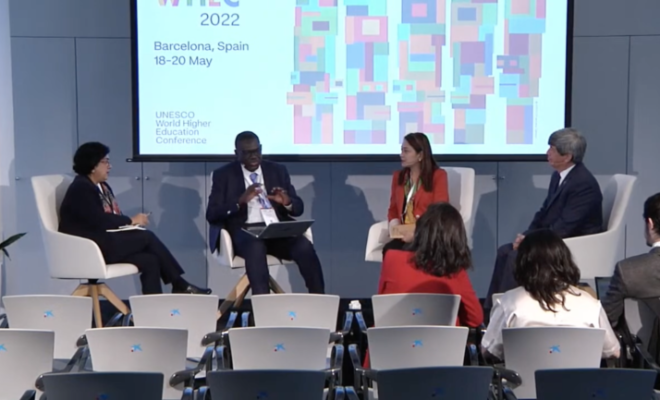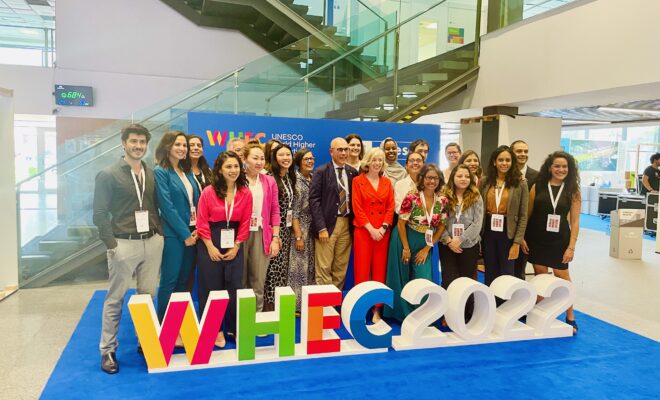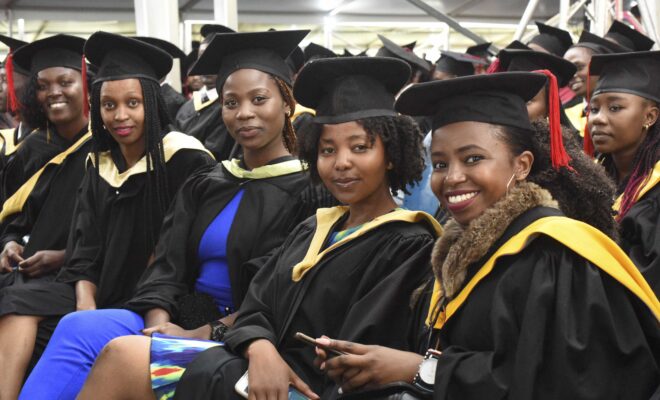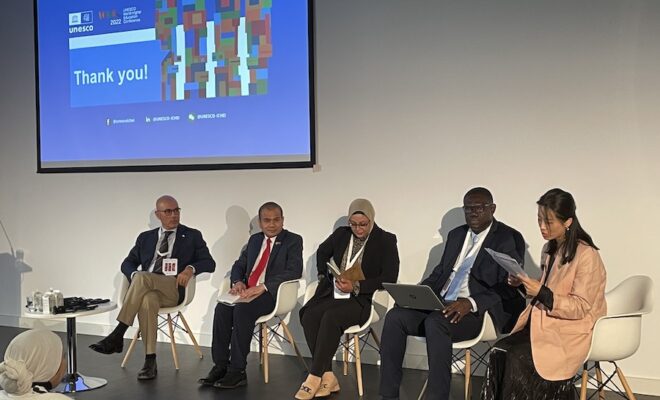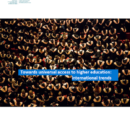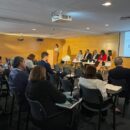Towards #WHEC2022. Webinar 8: Data and knowledge production
One of the main axes of UNESCO World Higher Education Conference #WHEC2022, to be held in Barcelona (Spain) next May, is data and knowledge production. In order to transfer the approaches of Latin America and the Caribbean, IESALC is carrying out a specific Regional Consultation, through a variety of events in order to bring together as many voices from different sectors as possible.
On this occasion, experts in the area participated in this online seminar – organized jointly with the IDB, OEI, Santander Universities and the Ibero-American General Secretariat.
Moderator: Victoria Galán-Muros, Chief of Research and Analysis – UNESCO IESALC
Some ideas from the speakers

Francesc Pedró, director of UNESCO IESALC
The objective of our Consultation is to gather the plurality of perspectives, in this case, in an area as apparently arduous as data can be. In order to make an adequate analysis of the situation of higher education -where we have come from- and to establish projections -where we are going- we need data density and quality.
It is said that “there are lies and there are statistics”. In the field of higher education, we have a lot of speeches and a lot of political communication and less data than we should have. We need the support, not only of institutions, but also of governments, to commit themselves decisively to collect data, and for them to be internationally comparable in order to draw connections and see how we can improve educational policies.

César Guadalupe, head of the Academic Department of Social and Political Sciences, Universidad del Pacífico, Peru
The UNESCO Institute for Statistics is in charge of collecting official statistics on enrollment (number of people, part-time or full-time), number of graduates and fields of study, teachers (part-time or full-time), international mobility (host countries, from which countries they come), financing (public or from the households themselves, resources and production conditions of each country in research and development), at the international level.
The international information must use some standardized definitions, as well as an international classification of educational levels, to allow comparisons of content between countries. At the level of enrollment, in a recently published report, of the 43 countries that make up the Latin American and Caribbean region, only 5 have reported information in the last 4 years; and the scarcity of information is a problem that is repeated throughout the world.
There are other sources of data, such as institutional data in: their websites, repositories, current research information systems (CRIS), rankings, world higher education database (WHED) administered by the International Association of Universities (IAU) and UNESCO.
It is not only about improving what already exists. We have a sustainable development agenda in two areas: global injustices and inequities, and sustainability of our planet.
A recent UNESCO report addresses how to ensure and encourage our higher education institutions – regardless of whether they are public or private – which have a public mandate, since education is a human right, to align themselves with the sustainable development agenda.
Autonomy is fundamental to operate spaces for dialogue, but it works well if it has some system of counterweight, otherwise they are self-serving institutions and the public purposes that societies have entrusted to them lose weight. This is directly linked to a governance issue in higher education.
We have a global political framework of concerns about the world and there is a framework of public purposes that derive from the fact that education is a right of the people, which should be better guaranteed.
The discipline has allowed us to have specialized knowledge, but it has limitations, especially for the treatment of complex problems. The integration of higher education between universities and other institutions is insufficient.
There are challenges in the flexibility and organization of programs: modular structures, micro-certifications, certification of capacities and not of studies, open education, etc. There are also challenges in the relationship between the professional and the academic, international mobility, recognition of the diversity of knowledge and cultural traditions.

Genaro Rodríguez, Vice-Minister of Science and Technology, Ministry of Higher Education, Science and Technology; Dominican Republic
The disintegration between basic and higher education does not allow information to be aligned towards a systematic continuity, where the integration that should exist is reflected.
In the Dominican Republic, this trend could be reversed by establishing operational plans that involve joint actions between both sectors, where the actions to be executed can be connected to contribute to the strengthening of education and achieve the expected result: a competitive, quality student, connected to the world’s new trends.

Lúcia Teixeira, president of SEMESO and MetaRed, Brazil
It is difficult for a university, public or private, to be relevant and have a social impact without researching society’s demands. The generation of data enables new knowledge, analysis of the environment and qualified decision making.
Today we are living a process of digital transformation that requires universities to develop a project so that all users can have digital experiences. This would mean improvements in processes and would increase the competitiveness of each country’s institutions.

Félix De Moya, director, senior researcher and founder of SCImago Group, Spain
Institutions, government agencies and international organizations have tried to promote open access to information and data, for economic reasons and because of the need for transparency in the processes of knowledge generation, to ensure the quality of the results.
HEIs play a decisive role, particularly in Latin America, where, in many cases, 90% of scientific knowledge is generated by them. However, this generation is very unequal between the region’s countries, where 60% is generated by a single country.

Dante Cid, Vice President of Global Strategic Networks for Latin America, Elsevier, Brazil
We must differentiate the data produced by the researcher during the process and others by the scientific publication. The difficulty lies in the standardization, in the presentation of the data, which require additional processes that allow us to generate knowledge and for science to contribute to the advancement of the Sustainable Development Goals.
The idea is to use these publications, which have been growing significantly, to generate knowledge and support the social function of the university in generating and debating hypotheses that can guide governments to achieve the SDGs.
Presentation
Producción de datos, César Guadalupe
Learn more: Latin America and the Caribbean consultation addressed main themes of the #WHEC2022

RELATED ITEMS
